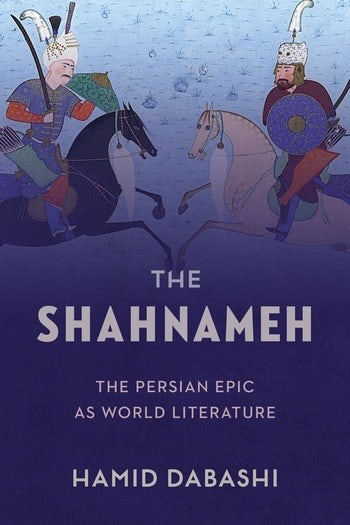Official Columbia University Press Page: http://cup.columbia.edu/book/the-shahnameh/9780231183444
The Shahnameh, an epic poem recounting the foundation of Iran across mythical, heroic, and historical ages, is the beating heart of Persian literature and culture. Composed by Abu al-Qasem Ferdowsi over a thirty-year period and completed in the year 1010, the epic has entertained generations of readers and profoundly shaped Persian culture, society, and politics. For a millennium, Iranian and Persian-speaking people around the globe have read, memorized, discussed, performed, adapted, and loved the poem.
In this book, Hamid Dabashi brings the Shahnameh to renewed global attention, encapsulating a lifetime of learning and teaching the Persian epic for a new generation of readers. Dabashi insightfully traces the epic’s history, authorship, poetic significance, complicated legacy of political uses and abuses, and enduring significance in colonial and postcolonial contexts. In addition to explaining and celebrating what makes the Shahnameh such a distinctive literary work, he also considers the poem in the context of other epics, such as the Aeneid and the Odyssey, and critical debates about the concept of world literature. Arguing that Ferdowsi’s epic and its reception broached this idea long before nineteenth-century Western literary criticism, Dabashi makes a powerful case that we need to rethink the very notion of “world literature” in light of his reading of the Persian epic.
Reviews:
This enlightening scholarly study will serve, for most Western readers, as their introduction to the Persian Book of Kings. . . . Dabashi provides background on Ferdowsi and the pre-Islamic epic tradition that shaped his poem before sharing colorful accounts of its cast of warrior kings, rebellious offspring, and seductive courtesans. Publishers Weekly
Monumental epic. M. A. Orthofer, The Complete Review
This is a work of imaginative activism. Hamid Dabashi coaxes and cajoles the reader to achieve the critical intimacy with the founding epic of Iran that he himself has acquired from childhood and through teaching and parenting. Historically conscientious, he is aware of the abuses of nationalism and triumphalism. His Shahnameh is a metaphysical epic of worthy failure. Such readings open many worlds, shaming the Eurocentric binaries of ‘world literature.’ Gayatri Chakravorty Spivak, University Professor, Columbia University
A major achievement. With wit and erudition, Hamid Dabashi has pushed open one of the great locked doors of world literature: the Shahnameh. In bringing the central work of Persian literature vividly to life, he also offers us a new way to understand all epics. More likely, in Dabashi’s brilliant reading, to undermine imperialistic ambitions than to proclaim them, the Shahnameh and its fellow epic poems reassert their relevance in our troubled times. Aravind Adiga, author of The White Tiger
This is an important book that will make its readers reconsider what they think they know about Iran’s national epic. It situates the poem in three contexts: The imperial world in which it was born, the world that it envisions, and the postcolonial world in which it is read and understood. Writing as a learned and passionate critic, Dabashi succeeds in placing the Shahnameh in the corpus of world literature, but somewhere beyond the reach of Eurocentrism. Like Dabashi’s other works, it will stay with its readers, and will open new vistas for the specialist and the nonspecialist alike. Mahmoud Omidsalar, author of Poetics and Politics of Iran’s National Epic, the Shahnameh
This is a work of love and care on the foundational story telling of the Persianate. Dabashi guides the reader to avoid the traps of the Eurocentered idea of ‘world literature.’ He invites us to reimagine and rewrite it starting from the Shahanameh instead of from a canonical Western narrative. A powerful political statement that shifts the geography of ‘world literature.’ Walter Mignolo, coauthor of On Decoloniality: Concepts, Analytics, Praxis
In The Shahnameh, Hamid Dabashi shows the global importance of the tenth-century Persian masterpiece and gives readers a strong sense of its literary magnificence. Dabashi allows us to see the world imagined by Abolqasem Ferdowsi in its richness and complexity eight centuries before Goethe made his influential claim for Weltliteratur and, thereby, helps us expand our sense of the world of literature. After reading Dabashi’s magisterial account of the great Iranian epic, we must return to the ongoing debates in world literature anew. Brian Edwards, author of After the American Century: The Ends of U.S. Culture in the Middle East
It is not preaching to the politically converted that achieves Dabashi’s goal of compelling others to read Ferdowsi’s epic. It is his love of his native epic coupled with his obvious gifts as a teacher that succeed where the tired cultural politics of the postcolonial academy fail. . . . Highly recommended. Choice
For those who wish to deepen their understanding of Persian poetry and literary history, The Shahnameh: The Persian Epic as World Literaturemakes a worthy companion to the English translation by Dick Davis. Australian Book Review
Dabashi has been teaching the Shahnameh for several years now and in his previous books, he has written in detail about Persian culture and literary tradition. This expertise, combined with his lucid writing, brings the epic alive and makes the reader curious about the world in which it was written, Asian Review of Books



 Columbia University
Columbia University Aljazeera
Aljazeera Middle East Eye
Middle East Eye Springer Palgrave
Springer Palgrave